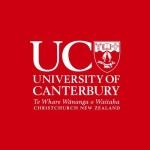Teaching excellence recognised
Well-respected political commentator Dr Therese Arseneau (Social and Political Sciences) is one of six University of Canterbury lecturers recognised in the 2011 UC Teaching Awards presented last night by Hon. Steven Joyce, Minister of Tertiary Education, Skills and Employment.
The awards, which were introduced in 2001, recognise excellence in teaching, including thesis supervision, in both undergraduate and graduate programmes.
The other winners were Dr Andrew Bainbridge-Smith (Electrical and Computer Engineering), Associate Professor Peter Falkenberg (Fine Arts, Music and Theatre), Professor Dave Kelly (Biological Sciences), Dr Richard Lobb (Computer Science and Software Engineering) and Russell Wordsworth (Management).
Deputy Vice Chancellor Professor Ian Town said that the awards seek to ensure that the University’s well-deserved reputation for excellence in teaching is both recognised and continues.
“I am especially proud of this year’s winners as they have all maintained their commitment to excellence in teaching despite the worst that nature could throw at us. These six join a distinguished group of teachers who help define the quality of our learning environment.”
Dr Arseneau is recognised across New Zealand for her skill in making highly complex political and electoral systems amenable to public discussion. For her students, she is “an inspiration who makes politics cool” with consistently high student and course survey results.
Dr Arseneau’s commitment to teaching has led to Prime Minister John Key lecturing her students on his role and to the honours students’ annual visit to Parliament with more access to senior staff and politicians than any such field trip in the world.
“I find New Zealand politics utterly fascinating and I wear my passion for this subject on my sleeve in the classroom,” says Dr Arseneau.
Dr Bainbridge-Smith is described by his head of department as “one of our most accomplished teachers and programme leaders whose enthusiasm is infectious”. He is known for putting a great deal of effort into his teaching and has a reputation among students for clear descriptions and examples, as well as being a patient and considerate advisor. His approach to teaching is to simplify concepts into “digestible chunks” and to ensure these are well understood. He plays a leading role in course and curriculum development and his innovations in teaching include a microprocessor board that allows students to develop code at home, and a project which divides students into software engineering teams that mimics industry practice.
Working with Professor Falkenberg is, according to his students, always exhilarating, stimulating, challenging and immensely rewarding. He doesn’t just teach, but encourages his students to take responsibility for their own learning. He has helped many explore and discover their own academic and artistic voices.
Integrating practical work into courses, testing theories in creative work and then analysing the results in scholarly writing, Professor Falkenberg is known as a teacher who encourages discussion and debate as the basis for critical thinking with the practical goal of creating something artistically.
“I am highly committed to working closely and collaboratively with students to investigate areas of interest, both aesthetic and social, that reflect their concerns as well as my own,” says Professor Falkenberg. “The work is most successful when everyone works together and stays in constant conversation.”
Professor Kelly’s commitment to excellence in teaching ecology has made him an important role model to both new and established colleagues. He focuses his teaching to dovetail with his students’ specific situations and motivations to maximise their learning – and their enjoyment. Constant revisions to the content and delivery of his teaching are one of the main elements of his success. Several years ago, he began to experiment with lecture podcasts, which led to the podcasting of all undergraduate lectures in biology, proving useful preparation for post-earthquake teaching in 2011.
Professor Kelly has also played a major role in curriculum planning, and has been instrumental in developing the skills of postgraduate students as a successful supervisor of more than 70 thesis students and offering general sessions on effective presentation and writing skills.
Dr Lobb’s teaching philosophy is simple: “I believe that to be an effective teacher you must be enthusiastic about your subject. Furthermore you need to convey that enthusiasm – it must be infectious.”
Within days of the February earthquakes Dr Lobb’s determination to continue teaching to his large cohort of undergraduate students resulted in the production of a series of online videos covering key concepts and the introduction of call-centre software which allowed remotely distributed students to have live chat sessions with their tutors.
He has also developed an online system, Py:Learn, which presents programming exercises to students and automatically executes and assesses their solution attempts giving instant feedback. Outside the formal curriculum he has coached programming contest teams, which have won national and international recognition.
While teaching evidence-based fact and theory will always be important, Mr Wordsworth sees his role as a human resource management lecturer to inspire his students to think and reflect critically on what they hear in class and experience in the world around them. “Only when students see how what we discuss in class affects their jobs, wallets or personal lives, will they being to reflect on and question what I teach, leading to more enquiring minds and sustained learning,” he says.
Mr Wordsworth actively engages his students by relating theoretical principles to everyday examples such as daily soaps, the news, YouTube clips etc. He has introduced a weekly online quiz to ensure prompt student feedback, which has improved attendance and student performance. He has also gained a reputation for providing extensive pastoral care, particularly for international students.
